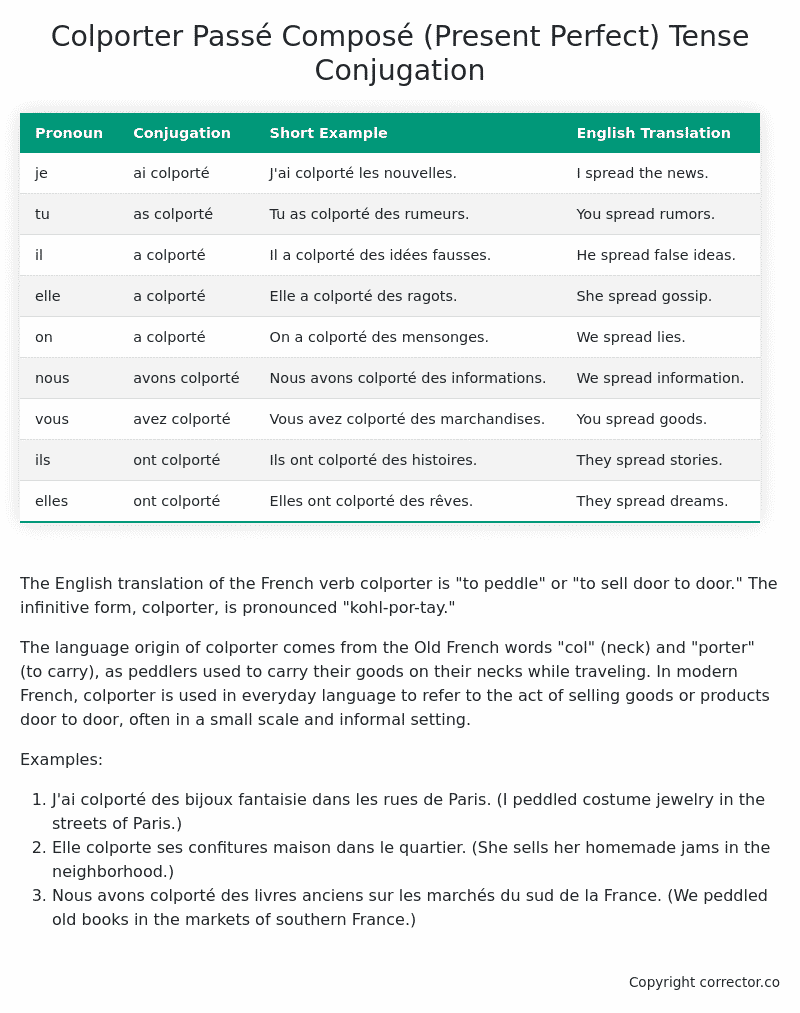Passé Composé (Present Perfect) Tense Conjugation of the French Verb colporter
Introduction to the verb colporter
The English translation of the French verb colporter is “to peddle” or “to sell door to door.” The infinitive form, colporter, is pronounced “kohl-por-tay.”
The language origin of colporter comes from the Old French words “col” (neck) and “porter” (to carry), as peddlers used to carry their goods on their necks while traveling. In modern French, colporter is used in everyday language to refer to the act of selling goods or products door to door, often in a small scale and informal setting.
Examples:
- J’ai colporté des bijoux fantaisie dans les rues de Paris. (I peddled costume jewelry in the streets of Paris.)
- Elle colporte ses confitures maison dans le quartier. (She sells her homemade jams in the neighborhood.)
- Nous avons colporté des livres anciens sur les marchés du sud de la France. (We peddled old books in the markets of southern France.)
Table of the Passé Composé (Present Perfect) Tense Conjugation of colporter
| Pronoun | Conjugation | Short Example | English Translation |
|---|---|---|---|
| je | ai colporté | J’ai colporté les nouvelles. | I spread the news. |
| tu | as colporté | Tu as colporté des rumeurs. | You spread rumors. |
| il | a colporté | Il a colporté des idées fausses. | He spread false ideas. |
| elle | a colporté | Elle a colporté des ragots. | She spread gossip. |
| on | a colporté | On a colporté des mensonges. | We spread lies. |
| nous | avons colporté | Nous avons colporté des informations. | We spread information. |
| vous | avez colporté | Vous avez colporté des marchandises. | You spread goods. |
| ils | ont colporté | Ils ont colporté des histoires. | They spread stories. |
| elles | ont colporté | Elles ont colporté des rêves. | They spread dreams. |
Other Conjugations for Colporter.
Le Present (Present Tense) Conjugation of the French Verb colporter
Imparfait (Imperfect) Tense Conjugation of the French Verb colporter
Passé Simple (Simple Past) Tense Conjugation of the French Verb colporter
Passé Composé (Present Perfect) Tense Conjugation of the French Verb colporter (this article)
Futur Simple (Simple Future) Tense Conjugation of the French Verb colporter
Futur Proche (Near Future) Tense Conjugation of the French Verb colporter
Plus-que-parfait (Pluperfect) Tense Conjugation of the French Verb colporter
Passé Antérieur (Past Anterior) Tense Conjugation of the French Verb colporter
Futur Antérieur (Future Anterior) Tense Conjugation of the French Verb colporter
Subjonctif Présent (Subjunctive Present) Tense Conjugation of the French Verb colporter
Subjonctif Passé (Subjunctive Past) Tense Conjugation of the French Verb colporter
Subjonctif Imparfait (Subjunctive Imperfect) Tense Conjugation of the French Verb colporter
Subjonctif Plus-que-parfait (Subjunctive Pluperfect) Tense Conjugation of the French Verb colporter
Conditionnel Présent (Conditional Present) Tense Conjugation of the French Verb colporter
Conditionnel Passé (Conditional Past) Tense Conjugation of the French Verb colporter
L’impératif Présent (Imperative Present) Tense Conjugation of the French Verb colporter
L’infinitif Présent (Infinitive Present) Tense Conjugation of the French Verb colporter
Struggling with French verbs or the language in general? Why not use our free French Grammar Checker – no registration required!
Get a FREE Download Study Sheet of this Conjugation 🔥
Simply right click the image below, click “save image” and get your free reference for the colporter present perfect tense conjugation!

Colporter – About the French Passé Composé (Present Perfect) Tense
Formation of the Passé Composé
Set the auxiliary verb with either
Conjugate the auxiliary verb
Add the past participle
Common everyday usage patterns
Narrating Past Events
Sequential Actions
Describing Completed Actions
Interactions with other tenses
Imperfect Tense
Conditional and Future Tenses
Summary
I hope you enjoyed this article on the verb colporter. Still in a learning mood? Check out another TOTALLY random French verb conjugation!


